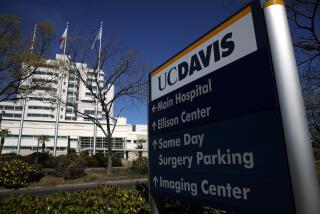Fewer California parents refuse to vaccinate children
- Share via
The number of California parents who cite personal beliefs in refusing to vaccinate their kindergartners dropped in 2014 for the first time in a dozen years, according to a Times data analysis.
The shift came amid rising alarm over the number of children being exempted from immunization, which prompted new campaigns to reverse the trend.
A state law that went into effect last year made it more difficult for parents to excuse kindergartners from vaccines. Instead of signing a form, parents now must get a signature from a healthcare provider saying that they have been counseled on the risks of rejecting vaccinations. Alternatively, they can declare they are followers of a religion that prohibits them from seeking medical advice from healthcare practitioners.
School districts with lower immunization rates have also been aggressively pressing parents to reconsider vaccinations, including sending them letters and directing them to free clinics that provide the shots.
Statewide, the rate of vaccine waivers for kindergartners entering school in the fall declined to 2.5% in 2014 from 3.1% in 2013. Bigger declines were seen in districts with some of the larger vaccine exemption rates.
In the Santa Monica-Malibu Unified School District, the rate fell from 14.8% to 11.5%; Capistrano Unified in south Orange County declined from 9.5% to 8.6%; Beverly Hills Unified declined from 11.9% to 5%; and Laguna Beach Unified declined from 15.1% to 2%, according to The Times’ analysis.
Health experts say that conditions for an outbreak worsen when 8% or more of the population is not immunized.
The decrease was modest considering that in 1996, the statewide “personal belief” exemption rate was just 0.46%. Still, experts said the drop was encouraging.
“I think we’re going in the right direction,” said Dr. Eric Handler, the Orange County public health officer whose agency has been grappling for the last few weeks with a measles outbreak that has sickened at least 71 people. “If people realize how safe the vaccine is and how serious measles can be, we can see even more of an increase in individuals getting immunized.”
California is one of about 20 states where parents can cite a personal belief waiver. Most states only allow religious and medical exemptions, and two permit only medical exemptions.
Studies show that states with stricter vaccine laws have higher rates of immunized kindergartners.
In New York City, parents can avoid having their children immunized only for religious or medical reasons. Only 0.19% of public school students received the religious exemption and 0.01% were granted a medical exemption.
“I think there’s a very strong evidence base that school immunization requirements are very effective,” said Dr. Jane Zucker, assistant commissioner for the New York City health department’s immunization bureau.
California has long been criticized for making it too easy for parents to avoid immunizing their children. Before, all a parent had to do was sign a slip of paper at the school office.
“Parents shouldn’t be able to take an exemption because it’s the easy thing to do,” said Shannon Stokley, an immunization expert at the U.S. Centers for Disease Control and Prevention.
The new immunization law signed by Gov. Jerry Brown requires all parents who sought the exemption to first speak with a healthcare provider. But in his signing statement, Brown allowed parents to seek a religious exemption without seeing a medical professional.
“That was a bit of a disappointment,” said Saad Omer, associate professor in the Rollins School of Public Health at Emory University. But he added that the new data show promise that the immunization law is working.
The measles cases spread at Disneyland a week before Christmas. Experts have said the theme park was a perfect incubator because it attracts visitors from all over the world, such as places in Europe and Asia where measles is still a large problem.
Since then, the disease has continued to spread, mostly through people who were not vaccinated.
Health officials have immunization records of 43 measles patients; 37 were not immunized, one had only one shot, and five were fully immunized.
Of the 71 cases, 62 were in California, with the rest in Utah, Washington, Colorado, Oregon, Arizona and Mexico. One in four of the California cases required hospitalization. Health officials have called this outbreak the worst in California since 2000, when domestic transmission of measles was declared eliminated in the United States.
At Huntington Beach High School, officials told about two dozen students without proof of immunization that they must stay away from campus for 21 days after one student with measles came to school.
A study published in the journal Pediatrics found that schools with high rates of vaccine-exempted students played a role in California’s major whooping cough outbreak in 2010 that sickened more than 9,000 people.
In Santa Monica, officials have been grappling for years with parents who worry that vaccines will harm their children. Julie Rousseau, 40, of Santa Monica, who is expecting a baby boy in three weeks, said she worries about protecting her son until he is old enough to get vaccinated.
“I feel surrounded by women here in Santa Monica, where I live, who have chosen to not vaccinate their children for personal reasons and it really is upsetting because by their decision to not vaccinate their own, they put their children at risk to infect others.”
More to Read
Sign up for Essential California
The most important California stories and recommendations in your inbox every morning.
You may occasionally receive promotional content from the Los Angeles Times.













